The dust swirls around my feet in the Comoro district of Dili, East Timor. It was but two days ago that I arrived, a newly minted freelance photographer visiting the world's newest country. My previous life as a newspaper photographer in Kansas City seem like a dream and as time goes on that life begins to fade away as a figment of my imagination. Dili and Kansas City cannot be any further away. The shortest distance between them is straight through the earth's molten core.
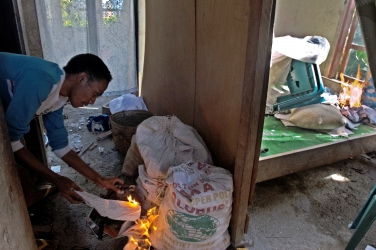 |
A gang member sets fire to a rival's home in Dili, Timor Leste, on June 6, 2006. Many homes were looted and torched as a result of the violence that gripped the country. Norman Ng/WpN |
Any new country has seen its fair share of growing pains and East Timor is no different. A former Portuguese colony, East Timor -- officially, Timor-Leste -- had gained its independence in 1999 after 24 years of brutal Indonesian rule. Recent violence erupted in late-March 2006 when Prime Minister Mari Alkatiri sacked 600 soldiers out of the country's 1,400-strong army. Their crime: petitioning for better working conditions within the army system. The powder keg exploded when shots were fired and blood was spilled. The conflict spread to the police force and civilians and split the country in two. Armed teenage gangs began roaming the streets, torching rivals' homes and terrorizing the population. There are now an estimated 100,000 people displaced by the violence. An international peacekeeping force has since entered the country and struggles to maintain order in the streets.
My journey to East Timor has been on my own dime. My editor from OnAsia Images in Bangkok had said that there might be some work with UNHCR but no promises. I push thoughts of my precarious financial situation to the back of my mind and focus on the task at hand.
"Let's go look for some action today," I told my driver, Manny. It did not take us long to find it.
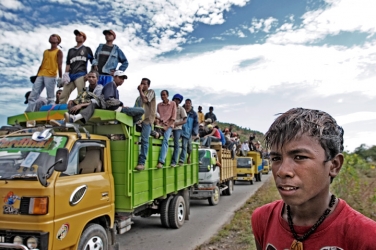 |
Hundreds of protesters from the surrounding districts descend on Timor Leste's capital, Dili, in a convoy to demand the resignation of Prime Minister Mari Alkatiri on June 6, 2006. The prime minister has been held responsible for failing to stop the violence that has gripped the country. Norman Ng/WpN |
A simple two-lane road is the demarcation line in Comoro. On the north are the Loro Sae – “people from where the sun rises," the easterners; to the south, the Loro Mono – "where the sun sets." The weapons of choice are simple catapults fashioned out of rubber bands, cloth slings, and an occasional bow and arrow. The most ubiquitous weapons are the unlimited number of rocks--easy to find and easy to discard in order to prove your innocence when the military arrives.
It began with taunts and obscene gestures out of rock-throwing range. A member of the Loro Mono steps ahead of his comrades and fans his hand, beckoning the enemy over. He flips them the bird. Insults them. Another plucks up his courage and steps forward. He pulls back his catapult and fires it in a high arc at maximum range. I hear the stone plink harmlessly off the road asphalt in front of the Loro Sae. More rocks follow; adrenaline takes its effect. They are ready for a fight. Watching this challenge from across the street, the Loro Sae are protective of their territory, especially of a street market which in more peaceful times will provide for the people.
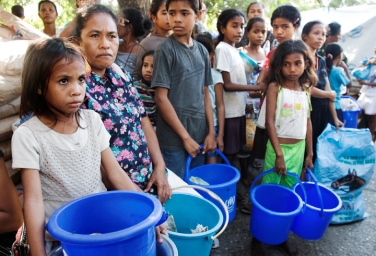 |
Refugees wait in line for emergency food aid at a makeshift refugee camp in Dili, Timor Leste, on June 5, 2006. There are an estimated 100,000 persons displaced by the country's violence. Norman Ng/WpN |
Beyond the market are their homes where mothers nestle their children and where what little worldly possessions they have lies. They take the offensive. A group of 10 to 20 burst from the market and began hurling rocks and pieces of metal debris. They pause only to take on more ammunition. The drizzle of rocks turns into a shower. Fires of hatred burn in the eyes of the combatants, some fueled by memories of seeing their homes going up in flames in the past few weeks. The Loro Mono beat a hasty retreat, scanning the skies for deadly projectiles and ducking as they go.
I began to realize that the advance of the Loro Sae is taking them to my hitherto safe position. Rocks aimed at the retreating Loro Mono rain down around me. None of them intentionally targeting me but an errant hit will hurt just as much. Now I beat a hasty retreat, my two cameras bouncing from my shoulders like jingle bells, and crouch behind a low wall out of the line of fire. In the distance, a row rumble grows louder. The ground shakes. The Australians in their armored personnel carriers have arrived. With their .50 caliber-mounted machine guns, scoped assault rifles and imposing physiques, the Australian soldiers present an impressive sight. Like an ink drop in water, the gangs melt way into the back alleys and narrow side streets. Those caught on the main road have already long dropped their rocks and ambled off with upturned palms in mock innocence. The soldiers do what they can, searching bodies and maintaining a menacing presence. "Aww, fuck you, you are not going to burn down another house!" screamed a soldier who found a lighter on a gang member. A boy in red defies the Australians' order to stop and bolted. Three soldiers give chase. I give chase.
"Oi you, stop there!"
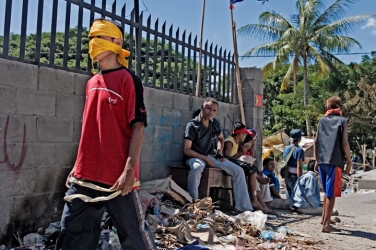 |
Gang members protect their territory as they keep a vigilant lookout for rival gangs along Comoro Road in Dili, Timor Leste, on Monday June 5, 2006. Norman Ng/WpN |
The chase takes them past muddy pathways and back alleys into a residential cluster. Curious families peer out from their windows and doorways. A wide-eyed girl backs herself against the wall as the soldiers advance, rifles at the ready. A flash of red in the distance and the soldiers quicken their pace. As the chase takes them deeper into the village it soon becomes clear that it is a lost cause.
"Ada orang pakai baju merah lari masuh sini?" (Is there someone wearing red who just ran in here?) one of the Australian soldiers asked a dumbfounded family who have come out to investigate the fracas.
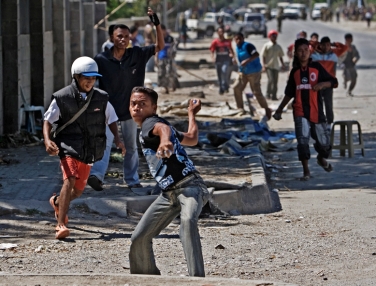 |
Ethnic gang members throw rocks at rival gangs as pockets of street fighting take place in Dili, the capital city of Timor Leste, despite the presence of foreign troops. Norman Ng/WpN |
"Tidak, tidak" (No, no) was the obvious answer. The Loro Sae protect their own.
Back on the main Comoro road things are quiet. The Australians will maintain a presence before speeding off again to the next hotspot. But like a game of Smack-a-Mole, the taunting and chest-thumping will began again minutes after they leave. Each side labeling each other as evil. Each side maintaining the need for weapons for self -defense. And so goes the circle of violence.
I pause and wait for the Australians to leave. Any minute now. I light a cigarette and notice that my hands are shaking.
Norman Ng stumbled across photojournalism as a senior at the University of Michigan and since then he has worked for major metropolitan daily newspapers like the Charlotte Observer and the Kansas City Star. His work has taken him to cover the tsunami aftermath in Aceh, sulphur mining in Java and Hurricane Katrina devastation in New Orleans. On January 2006, Norman moved to Asia in order to cover stories closer to home and his heart. Norman Ng is currently based out of sunny Singapore and is available for assignments. His work is represented by OnAsia Images and World Picture News.







